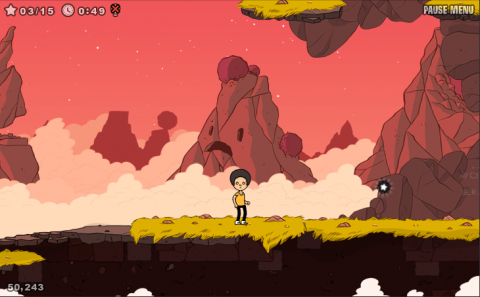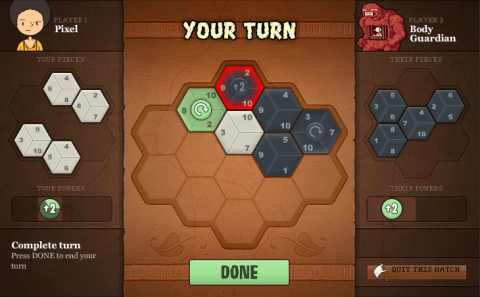The End is a game about death.
In a sense, that's not really a bold new concept for video games, as most of them predicate challenge based on the player's ability to avoid death. But games are only beginning to explore the emotional spectrum, and that includes having a grounded conversation about what happens when life is over.
It's hard to imagine a few video game characters having that conversation, let alone one within a context where the game's suggesting these large questions in a Flash-based platformer aimed at teenagers.
The End was funded by UK broadcaster Channel 4 and commissioned to developer Preloaded. By UK law, the broadcaster is required to produce a portion of educational content for 14-to-19-year-olds.

C4 Education is a subdivision of Channel 4 at large, and while educational content was previously piped exclusively through the television, that changed in 2008, when the budget was applied to experimental games funneled to the web, mobile, and other places. The idea was premised on the belief that crowd was playing around on the Internet anyway.
Preloaded had worked with C4 Education on other projects--1066, Trafalgar Origins--and when some research appeared showing a lack of religious knowledge amongst teens, an idea gained traction.
"One thing religion does very well is provide a narrative to death, a support framework which gives answers and reason," explained Preloaded senior producer Charles Batho. "The End sets out to level the playing field, presenting a variety of views about life and mortality from famous thinkers of our time. It's not a non-religious game, just philosophical."
The End doesn't pitch what happens after death, it takes place moments before. After designing a character, the game boots to suburbia. Your character looks up--it's a meteor! From there, the game plays upon life flashing before your eyes in the moment before death. What happens during the "game" part is an exploration and reflection on the meaning of death.
The End was originally dubbed "Afterlife" internally, but the name was ditched, as it was feared that would imply too much about what may or may not happen after life. More ambiguity was needed.
Unlike a first-person-shooter, there's no outline for how to make a game like this, no blueprint to follow. Batho and his team decided the best way to understand the target audience was to talk to them.
"For this project we talked to groups of kids in the age range of 14-19 about death and imagery around death before we started any production," he said. "In one memorable early exercise we asked them to draw their ideal funeral. Some of the work produced was extraordinary. We also tested early and throughout production with little digital or paper based demos of each element that became part of the final game. It's hard work, but this face-to-face time is hugely influential in the end product."

As it turns out, The End isn't an awful platformer, either. It's not Super Meat Boy, but given what one expects from a piece of educational software, it doesn't totally distract from the rest of the experience. You can skip past most of the platforming if the floaty physics bother you, and instead get into the heart of the gameplay, in which a numbers-based puzzle game infused with a bunch of unlockable powers. It's a little like Puzzle Quest, with some light math sprinkled in.
Making sure the "game" part was worth playing was important to the team. Consumers, especially teenagers, have a million distractions in today's digital world. Being exposed to mediocrity would likely result in them closing the browser window, making the exercise pointless.
It's hard to imagine talking about death without religion. Almost every conversation about death is discussed through the prism of religion and the implication of belief, but giving credence to one belief would have sent Preloaded down a rabbit hole.
"If we had introduced a Christian interpretation of death, then we'd have needed to balance it with the Islamic interpretation, and every other religion, which would have skewed the game and taken it in entirely different direction," said Batho. "So we side stepped religion entirely. What we tried to do with the issues associated with each death object was provide ideas that could emotionally support a person if they had suffered a loss, which is what many religions provide to those who believe in them."
After defeating each stage's "boss," the game asks a question. You answer options are "yes" or "no."
- Is it possible to be happy simply living in the moment?
- Do you want to live forever?
- Would you still be yourself if your mind was put into another body?
- Should people be able to choose how they die?
- Do other people’s memories mean that we live on after death?
These aren't exactly easy questions to answer on the fly, and reminded me of the moments I'd fiddle my thumbs in the equally contemplative Catherine. Catherine's more concerned with the complications of sex, love, and growing up, but the personal implications are nearly as profound, and while I didn't spend as much time mulling my answers, I did try to answer honestly.
The answers inform a "Death Dial," which maps your responses and tries to provide context. It's based on the famous Political Compass, often used to gauge where a person falls on the political spectrum. My answers put me near with theoretical physicist Albert Einstein. I'll take that.
"We hope to inspire and inform players with new ideas that can help them deal with the advent of death in their lives, however spiritual (or not) they may be," said Batho.
It wouldn't be surprising to learn players were blowing the questions off, but with message board threads with titles like "What happens if u answer a question wrong?" in a game where there are no wrong answers, it appears the team succeeded in getting some players to think.
"We tested an early demo of 48 questions with users and they responded well," he said. "We tried to keep the questions easily understandable but also give them some 'weight.' For some younger players they've not really been introduced to questions like this before. 'Weird but interesting' and 'It really makes me think a lot about things I normally wouldn't' being common responses."
Making games takes time--a long time. The idea of working on a game about such a morbid subject, especially one that's so hard to talk about, sounds rough.
"We did all learn a lot about our own views about death and how they contrasted with each other," said Batho. "When that debate began, we realised we were on to something really solid. The issues are heavy, but we deliberately wanted to juxtapose this with a pure-play, fun game experience. Once the game design was nailed, we were too busy making the game and bringing it all together that there wasn't any time left to feel uncomfortable."
You can try out The End at www.playtheend.com.